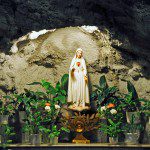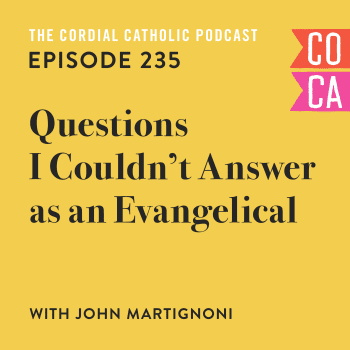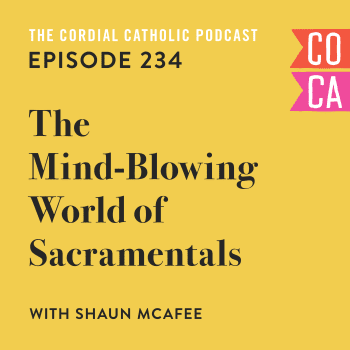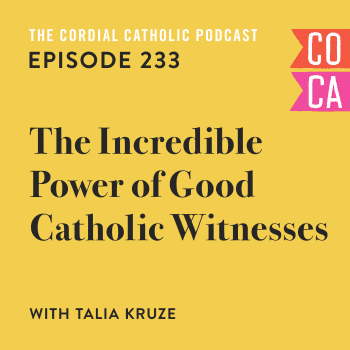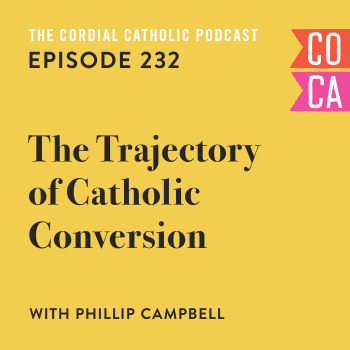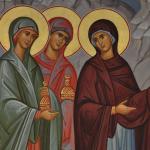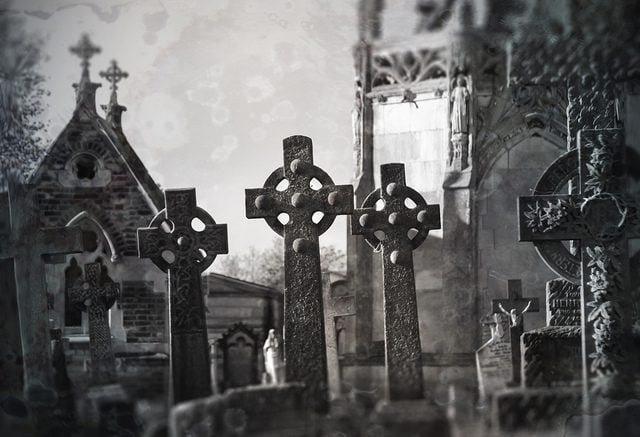
It was a friend from elementary school, a guy I hadn’t seen in some fifteen or sixteen years. He let me in through the door of what must’ve been his house—a nondescript suburban bungalow of seventies vintage. He led me into his living room, a wooden-paneled situation decorated without any sense of semblance, or taste, with over-sized puffy couches and a television that took up most of one wall. It was dirty, sticky, and I sat down only reluctantly.
Hurriedly, as if we were quickly running out of time, he loaded our respective PowerPoint presentations up onto an unseen computer then flicked them up onto the enormous TV as it blinked to life. It was a straight-forward format, we decided, he presented an argument, then me. One by one. Ten PowerPoint slides each.
When we were finally ready I began, “Why Catholicism is true…”
About four slides into the debate I woke up. It was a really, really strange dream.
A good friend of mine and a very wise person once made the point that people are drawn to something first and foremost by seeing someone else live it out, by their story—their narrative. There are, I suppose, a precious people drawn in by a good argument, by a well-reasoned thesis, or by a well-spoken and articulate debater but at a certain point debate must come to an end.
At a certain point it’s the living and not the debating that draws them in.
I think my friend is right.
A natural response for someone stumbling upon something new is to go at it with zeal. I think this is generally true. When I first became a Christian, through a Protestant friend in my early teens, I was zealous and spoiling for a chance to share everything I thought I knew about God, Jesus Christ, and the universe.
Eventually my faith life cooled off, or normalized, and I simply lived my life—a new Christian life but certainly not a life geared towards expressive evangelization and zealous debate.
My slow-burning conversion to Catholicism has been like kindling added to a fifteen year old smoldering fire.
For the first time since my initial Christian conversion I’m learning and growing with a zeal that comes, unmistakably, from the Holy Spirit. It’s the zeal of new knowledge and new excitement. It’s a zeal, often compared by Catholic converts, to the Lord’s parable of the Pearl of Great Price. I’ve found something new, and it’s incredible.
This time around, in my Catholic conversion, it’s a discovery of something that, as it turns out, was there all along. It’s the discovery of theology and tradition that was in my Bible the whole time if only I’d known how to look for it. It’s the discovery of an aesthetic and intellectual life that, no matter where I’ve lived, has probably been in a parish right down the street—but I didn’t even know what a parish was.
The discovery of Catholicism has been the discovery of something hidden, right in plain sight but, once found, has completely overwhelmed me. Maybe it’s like standing on the edge of the ocean looking back onto land, then turning around to see the a forty-foot tidal wave.
On second thought, being drowned by a wave is probably a poor analogy.
Nonetheless, in a strange juxtaposition to my initial conversion to Christianity, I’ve become, once again, a zealot for my faith. This strange new thing, this Catholicism that was hiding right in plain sight, is a gift of unimaginable worth and my first and fundamental reaction has been to share it with everyone I meet. Because that’s what you want to do. Because it’s incredible and everyone must know. Especially my Protestant friends, especially those that were living like I was living and—oh my goodness—aren’t they going to flip a lid when I show them what I’ve learned.
Predictably, all does not go as planned.
There comes a point, I’ve learned, that debate must cease. Like my wise and long-suffering friend has said, it’s in the living out that people see what your faith really means. It’s in the story—in this case my story—that people are compelled and drawn in. And, of course, he’s right—I did tell you he’s wise, after all.
We’re a people of the story, a people of the narrative. That’s as deep of a truth as anything you could tell about human beings. If science had a way to detect it you can be sure it’d be encoded in our DNA. We express ourselves, we live and breathe, through our stories. The stories we tell ourselves, the stories we tell each other, and the stories that are told to us. Anglican biblical theologian N.T. Wright makes this his thesis for reading the Bible: understand the story you’re in and the part you play.
Naturally, then, I must tell my story. We converts learn this, I think, at some point. If we don’t, we must.
If we’re to be successful ambassadors for Catholicism we must learn what it means to tell our story. We must, urgently and humbly, learn how to tell stories in the quiet coffee shop conversation rather than rattle off our rhetoric in the lecture hall debate. We must stop, and think, and reflect on where and when and how the Holy Spirit reached into our lives to tug us in one direction or another—to bring this character into our narrative, or to gently push that one out. We must learn to see God working through our lives, our conversions, and to pick up those threads and run with them.
And we must learn how to live like Catholics.
I stopped debating because my wise friend is right. There comes a point when the people around you don’t want to hear the Catholic perspective on justification or why purgatory is biblical. There comes a time when all your most well-prepared polemics and apologetic treaties cease to mean very much—and cease to convince those you most desperately want to be convinced.
There comes a point when you have to just get on living.
Now don’t get me wrong, this isn’t a decrease of the faith, but an increase. I like to talk, and write, about things I’m discovering and have discovered about the Catholic faith. There’s value in that. As a Protestant I had so many misconceptions about the Catholic Church you could’ve filled the ark. Many Catholics I know have their own fair share, too. But for all that writing, all that debating, there comes a time when, I’ve learned, you must just live.
And living, trusting that God will manifest Himself through what you do, that takes faith.
If I live an authentically Catholic and authentically Christian life that will tell its own story. If I live out my Catholic faith in a wholly compelling and honesty way that will speak more about the authenticity and truth of the Catholic Church than anything I could argue or debate ever could.
For Christianity this is nothing new. We are, after all, a people of the story. Someone once called it the greatest story ever told. This, I guess, is my small, strange part in it. I will debate, I will discuss, and I will gladly provide a reason for what I believe. But I will, first and foremost, live.


